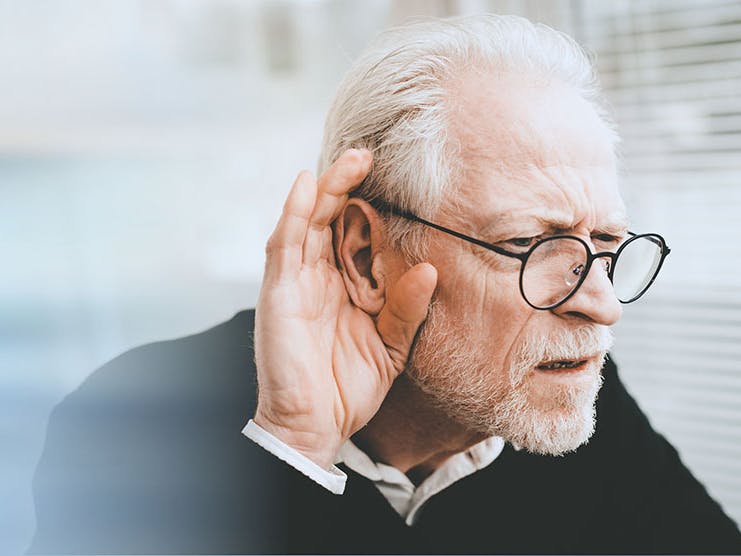
Though hearing loss is a common problem in older adults, that doesn’t make it an easy thing to cope with. Hearing loss is a huge change in a person’s life and can leave you feeling isolated and frustrated.
About one in three people between the ages of 65 and 75 has hearing loss, according to theNational Institutes of Health. That number jumps to 50% for people over 75. Age-related hearing loss, which is calledpresbycusis, comes on gradually. And on average, it takes someonealmost four yearsto seek help after noticing a hearing difficulty.
Symptoms of hearing loss
Sometimes people experience hearing loss and don’t even realize it. There are several signs to look out for, though, including:
- Difficulty hearing over the telephone
- Difficulty following conversations when two or more people are talking
- Asking people to repeat themselves often
- Needing to turn up the volume on the television so loud that others complain
- Having trouble hearing because of background noise
- Thinking many people in your life are mumbling
If you’re experiencing any or all of these symptoms, talk with your doctor. Primary care doctors may be able to diagnose and treat the condition. If not, they will refer you to an audiologist or hearing specialist.
Impact of hearing loss
When you have a hearing impairment, it can be a huge disruption to your life. Besides affecting your ability to listen, interact, and socialize, it can also affect your mental and emotional well-being.
“[People] lose connections and don’t understand what people are talking about,” audiologist Paul Milner told the website Healthy Hearing. He added that it can make people feel paranoid. “[E]ven without the most serious hearing loss, people might think others are talking about them because they can’t follow the conversation.”
Other negative impacts on well-being include:
- Isolation and social withdrawal. To avoid feeling the frustration of hearing difficulties while socializing, some people may avoid going out altogether.
- Fatigue. Hearing loss can cause extreme tiredness from constantly straining to hear and keep up with discussions. This can zap your overall energy.
- Depression and anxiety. For some people, becoming hearing impaired can feel like a part of themselves has been lost. It can also cause feelings of stress when interacting with others.
Dealing with the condition in social settings can be a little tricky, but the best way is to let people know at the beginning of a conversation that you are hearing impaired. That way, everyone is on the same page.
Devices that can help
While hearing loss is a huge change, there are devices that can help minimize the disruption to your life. Here are a few of the most common.
Hearing aids
These are battery-run electronic devices that make sounds louder. There are many different kinds, and an audiologist or hearing aid specialist can fit you for one and teach you how to use it.
Amplifiers
These devices can be used with phones to increase the volume. Some landline phones have amplifiers built in.
Assistive Listening Devices (ALDs)
These are personal, hand-held amplifiers that help you communicate in one-to-one conversations. They bring the sound you wish to hear closer to your ears.
Alerting devices
These devices help make you aware of sounds, such as the doorbell or a ringing phone, by sending you a signal that you can recognize, like a flashing light or a vibration.
Hearing loop
These assistive listening systems exist in many public spaces all over the world to help those with hearing loss. The inductive loop system provides a magnetic, wireless signal that is picked up by hearing devices and helps people hear more clearly.
There are a lot of different options for those who are hearing impaired, both for personal use and in a public setting. You should speak with a doctor or specialist to find the best one for you.
Good news!
Thanks to a recent FDA ruling, you can now buy hearing aids over-the-counter.
If your hearing loss is mild to moderate, you no longer have to see a doctor or specialist for an exam and fitting. This means easier access and lower costs.
The Hearing Loss Association of America’s (HLAA) website can help you figure out whether an over-the-counter hearing aid is a good option for you.
If your hearing loss is severe, however, you’ll still need to see a specialist for a prescription. Original Medicare doesn’t cover this cost, but many Medicare Advantage plans do.
Additional sources
Does Medicare Cover Hearing Aids?
Internal Website Link
Dental, Vision, and Hearing Insurance
Internal Website Link
Can You Lose Your Medicare?
Internal Website Link


